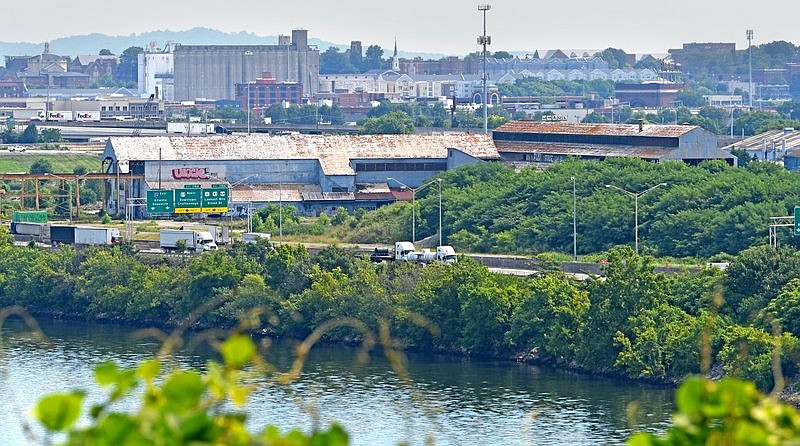With the Hamilton County Commission approving a key funding mechanism and the creation of a body to oversee the issuance of bonds, plans to construct a new $79.5 million multiuse stadium for the Chattanooga Lookouts on the former U.S. Pipe/Wheland Foundry site have cleared another hurdle.
"We're thrilled that we're one step closer to moving forward," Lookouts managing owner Jason Freier told the Chattanooga Times Free Press.
The commission voted to draw a 470-acre special tax district including the proposed stadium site, a designation that would have a lifespan of 30 years. Through a method called tax increment financing, a portion of new property tax revenue generated by surrounding development would fund most of the cost of the stadium.
Commissioners also authorized the formation of a new sports authority with a seven-member board of directors that would issue the 30-year bonds needed to construct the facility. The sports authority would also own the finished stadium project, which would sit on about 8 acres of land donated by Perimeter Properties.
The votes were 8-1, with Commissioner Tim Boyd, R-East Brainerd, voting no.
"There's just too many unanswered questions," Boyd told the Times Free Press after the meeting. "There are too many hypotheticals."
The proposal now goes to Chattanooga City Council for a final vote Tuesday.
The County Commission's approval of the plan comes after hours of conversation during meetings over the past few weeks and dozens of questions directed at the team, developers and economic development officials.
Assuming developers invest at least $350 million in the district, new property tax revenue generated around the site would cover 58% of the project cost. An escalating $1 million annual lease paid by the Lookouts would account for another 22%.
The rest of the funding would come from state and local sales tax revenue generated in the new stadium (14%), parking revenues from events (2%) and $1.4 million apiece from the city and the county (4%), an amount that would be paid out over multiple years starting in fiscal year 2025.
Public officials have stressed that the $350 million figure is a conservative estimate and have predicted that development could reach in excess of $1 billion around the property. Core Development in Nashville is already planning a residential and commercial project on the Wheland Foundry site valued at about $160 million.
Responding to a question about how officials would handle cost overruns for the stadium, Jermaine Freeman, senior adviser for economic opportunity for Chattanooga Mayor Tim Kelly, said that is something the sports authority would negotiate with the team, but it would not issue more debt.
Freier told the Times Free Press that nobody can know the precise cost of the stadium until it has been designed. He added that Knoxville officials considered the same set of resolutions Hamilton County commissioners approved Wednesday when they were preparing to launch their own stadium project for the Tennessee Smokies.
"It's only after you do this that you can start getting into the costing process," he said. "The other two ballparks that we've done we delivered on time and on budget. What we do is we try to build to a budget.
"There's always the possibility that things will go crazy in one direction or the other, but the way that we've always handled this is we know what the budget is, you design the stadium you would like to see and then you say, 'If I can't afford that, what can we cut?'" Freier said. "And we work through an iterative process where we value engineer it to the budget."
Commissioner Steve Highlander, R-Ooltewah, said he thought it was a good plan overall. But, he had some concerns about the long-term obligations to county residents and how the special tax district would impact funding available for wider infrastructure requirements.
"We have infrastructure needs not just on South Broad," he said during the meeting. "We have them all over this county."
If the project is paid off before the 30-year term of the district is complete, Highlander said, he would prefer to see excess revenue generated in the zone go towards infrastructure projects across the city and county rather than being restricted to those 470 acres.
Freeman confirmed in response to a question from Commissioner Ken Smith, R-Hixson, that the city and county would be able to retract or revoke the tax district once all its obligations are paid off.
After the vote, Hamilton County Mayor Jim Coppinger commended commissioners and members of the Lookouts leadership for keeping the focus on the project in the face of misrepresentation and misinformation.
"As they start the groundbreakings and the ribbon-cuttings and the first pitches thrown out at the baseball stadium, I want to go down there and see what politicians go down there to say, 'Look at what I did,'" Coppinger said.
Contact David Floyd at dfloyd@timesfreepress.com or at 423-757-6249. Follow him on Twitter @flavid_doyd.
